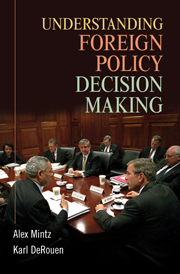Book contents
- Frontmatter
- Contents
- Acknowledgments
- PART ONE INTRODUCTION
- PART TWO THE DECISION ENVIRONMENT
- PART THREE MODELS OF DECISION MAKING
- PART FOUR DETERMINANTS OF FOREIGN POLICY DECISION MAKING
- PART FIVE MARKETING FOREIGN POLICY
- 8 Framing, Marketing, and Media Effects on Foreign Policy Decision Making
- PART SIX CONCLUSION
- Appendix: Foreign Policy Simulation and Exercise
- References
- Index
8 - Framing, Marketing, and Media Effects on Foreign Policy Decision Making
Published online by Cambridge University Press: 05 June 2012
- Frontmatter
- Contents
- Acknowledgments
- PART ONE INTRODUCTION
- PART TWO THE DECISION ENVIRONMENT
- PART THREE MODELS OF DECISION MAKING
- PART FOUR DETERMINANTS OF FOREIGN POLICY DECISION MAKING
- PART FIVE MARKETING FOREIGN POLICY
- 8 Framing, Marketing, and Media Effects on Foreign Policy Decision Making
- PART SIX CONCLUSION
- Appendix: Foreign Policy Simulation and Exercise
- References
- Index
Summary
To garner public support for their foreign and security policies, state leaders need to market their policies to the public, the opposition, and their constituencies, allies, and adversaries. This chapter introduces several marketing and framing “tactics” that leaders use to promote their foreign policies.
The discipline of marketing primarily deals with the marketing of products and services to consumers and customer relationship management (CRM). Political marketing focuses on the marketing of political candidates, political platforms, and political parties. International relations marketing deals with the marketing of foreign policy and national security policies, including peace and war marketing (Mintz 2006). As we have shown in previous chapters, psychological factors contribute greatly to our understanding of foreign policy decision making. Psychological theories also draw our attention to the important role of framing and marketing foreign policy decisions. In this chapter, we show that marketing and framing exist and matter in foreign policy making.
MARKETING EFFECTS
Just as marketers promote their products to generate sales, it is crucial for state leaders to market their policies to different constituencies. Leaders can market war (including war initiation, escalation, and termination), peace, international agreements, and many other foreign policy decisions. One marketing tactic often used by leaders is framing. Framing, as previously explained, refers to the manner in which an issue is presented (see, e.g., Tversky and Kahneman 1981; Frisch 1993). Leaders try to impose or introduce and promote frames that affect how the public views a particular situation.
- Type
- Chapter
- Information
- Understanding Foreign Policy Decision Making , pp. 149 - 166Publisher: Cambridge University PressPrint publication year: 2010

